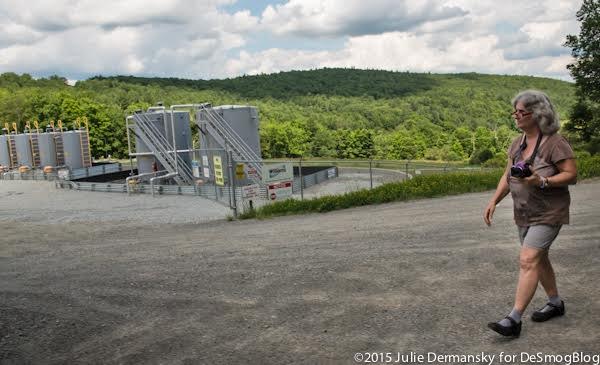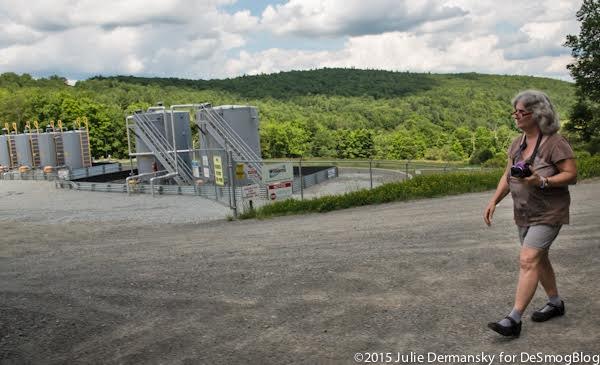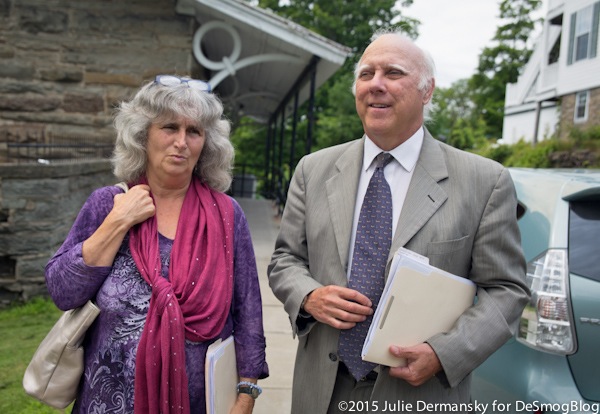
Did you know that Truthout is a nonprofit and independently funded by readers like you? If you value what we do, please support our work with a donation.
“Who is the danger here?” Vera Scroggins, an anti-fracking activist based in Susquehanna County asked after reaching an agreement to resolve a case in which she faced criminal charges at the Montrose, Pennsylvania courthouse. “Me or an industry that is contaminating the air and water?”
Scroggins, 64, exited the Montrose courtroom, greeting her supporters after signing an Accelerated Rehabilitative Disposition (A.R.D.) agreement, a Pennsylvania deal usually offered to first time offenders, covering her six wire-tapping charges.
Those felony charges were leveled against her for an incident that occurred in 2013, when she videotaped an interaction between herself and a lawyer and his secretary denying her anti-fracking group a permit to participate in a local Fourth of July Parade. Although Scroggins believes the charges against her are bogus since she was openly filming, she said she cannot afford the cost of a trial.
The deal will require Scroggins to do community service, pay a fine estimated to be $1500, and to spend a period on probation. A county judge will decide the amount of the fine, the type of service and how long a probation time Scroggins will be on.
If Scroggins is arrested during the period set for her probation – which could be up to one year – the deal could be revoked. Scroggins sees the case against her as a continued campaign of intimidation waged by Cabot Oil and Gas and the local government.
The wiretapping charges against Scroggins fell into a legal gray area under Pennsylvania law. Even if the prosecution proved at trial that she had done everything she was accused of, it still would not be entirely clear that her conduct was illegal. But by avoiding a trial, she says, she can use her resources to continue to fight a Montrose judge’s verdict against her earlier this year for allegedly violating an injunction obtained by Cabot barring her from going closer than 100 feet to the company’s sites.
That case made international headlines in 2013, when a local court ordered Scroggins banned from over 300 square miles of the county, including supermarkets, her vet’s office and friends’ homes, to keep her from conducting tours for the press and activists to see the impacts of drilling, which Cabot argued amounted to trespassing. Scroggins successfully argued that injuction was unconstitutional, unlawful, and set a dangerous precedent.
She spent five months living under that restrictive injunction until its scope was sharply reduced as part of that review. Since then, Cabot has attempted to have Scroggins jailed for alleged violations of the newly narrowed injunction.
In April, Scroggins was told to pay a $1000 fine or face prison until the fine was paid, after a gas company contractor claimed under oath that he had seen her walk on restricted land, testimony Scroggins countered was false. Witnesses who were with Scroggins as she gave them a tour back up her claim. She defiantly said she’d go to prison before paying a fine for a crime she didn’t commit and appealed that decision.
She was hit with the wiretapping charges days later. “Industry is trying to intimidate me and others who might follow my lead,” Scroggins told DeSmog.
 Scroggins continues to document the fracking industry in Susquehanna County. (Photo: Julie Dermansky)
Scroggins continues to document the fracking industry in Susquehanna County. (Photo: Julie Dermansky)
Over the past few years, Scroggins has repeatedly found herself embroiled in legal battles that not only carry implications for the dispute over fracking in Pennsylvania and nationwide, but also for fundamental principles of access to information, and freedom of speech and assembly.
Pennsylvania is one of roughly a dozen states that require all participants in a conversation to consent to a recording, but the law only applies when the speaker has a reasonable expectation of privacy – a question that becomes tricky when conversations take place in person not over the phone, especially if a camera is in view.
Her cases raise other fundamental questions about privacy and power: Should an oil and gas company be allowed to keep its activities, conducted in open view, private? And can locally elected judiciary and prosecutors act independently and objectively when a powerful industry is involved.
“I am now on my sixth visit to a courthouse for being a concerned citizen and an activist in my own community in my own county,” Scroggins told DeSmog.
 Vera Scroggins leaves hearing with her lawyer Gerald Kinchy in Montrose, Pennsylvania after signing the agreement. (Photo: 2015 Julie Dermansky)
Vera Scroggins leaves hearing with her lawyer Gerald Kinchy in Montrose, Pennsylvania after signing the agreement. (Photo: 2015 Julie Dermansky)“False testimony can put someone at risk,” she said. Her recent experiences with the justice system made her question the fundamental fairness of the criminal justice system.”How much is injustice is going on across the country? How many people are in jail because of false testimony?”
Scroggins didn’t make the conversation public since Kelly later objected to being recorded. Instead she turned the recording over to prosecutors since she believed the anti-fracking group’s rights were potentially violated when the group was denied a permit to participate in the parade.
Two years later, that prosecutor’s office charged Scroggins instead, shortly before the statue of limitations on a wiretapping charge would have run out.
Advocates for government transparency have long argued that keeping policy debates public – whether about the environment or parades or justice itself – is healthy in a democracy.
“Publicity is justly commended as a remedy for social and industrial diseases,” Justice Louis T. Brandeis wrote in 1914. “Sunlight is said to be the best of disinfectants; electric light the most efficient policeman.”
Scroggins has spent years seeking to spotlight the activities of shale gas drillers in her county, home to Dimock, PA, where some of the most controversial cases of water contamination have taken place.
Since many residents whose water has been polluted agreed to non-disclosure agreements – gag orders – as part of their deals with drillers, they can’t describe their experiences. But Scroggins has taken members of the press, government officials, activists and others on tours of the area and described what she knows about their cases.
Cabot’s legal motions against Scroggins have not daunted her. On June 22 she led a tour for a group from Australia that included members of Parliament who came to learn about the fracking industry in PA before making any decisions about permitting fracking activity to start near residential areas in Australia.
Scroggins took the group to visit residents whose water was contaminated, as she has done during hundreds of tours of Susquehanna County that she has conducted over the last seven years.
Besides leading the tours, Scroggins documents the industrial developments in the area almost daily. She posts videos of what she finds on YouTube. She believes the work she is doing will make it impossible for officials to later deny that they didn’t knew what was happening.
Franklin Forks resident Tammy Manning, whom Scroggins brings many of the tours to visit, is grateful for the work Scroggins does. “I’m hopeful we had a little to do with New York’s stopping the process,” Manning says.
Holding Trump accountable for his illegal war on Iran
The devastating American and Israeli attacks have killed hundreds of Iranians, and the death toll continues to rise.
As independent media, what we do next matters a lot. It’s up to us to report the truth, demand accountability, and reckon with the consequences of U.S. militarism at this cataclysmic historical moment.
Trump may be an authoritarian, but he is not entirely invulnerable, nor are the elected officials who have given him pass after pass. We cannot let him believe for a second longer that he can get away with something this wildly illegal or recklessly dangerous without accountability.
We ask for your support as we carry out our media resistance to unchecked militarism. Please make a tax-deductible one-time or monthly donation to Truthout.